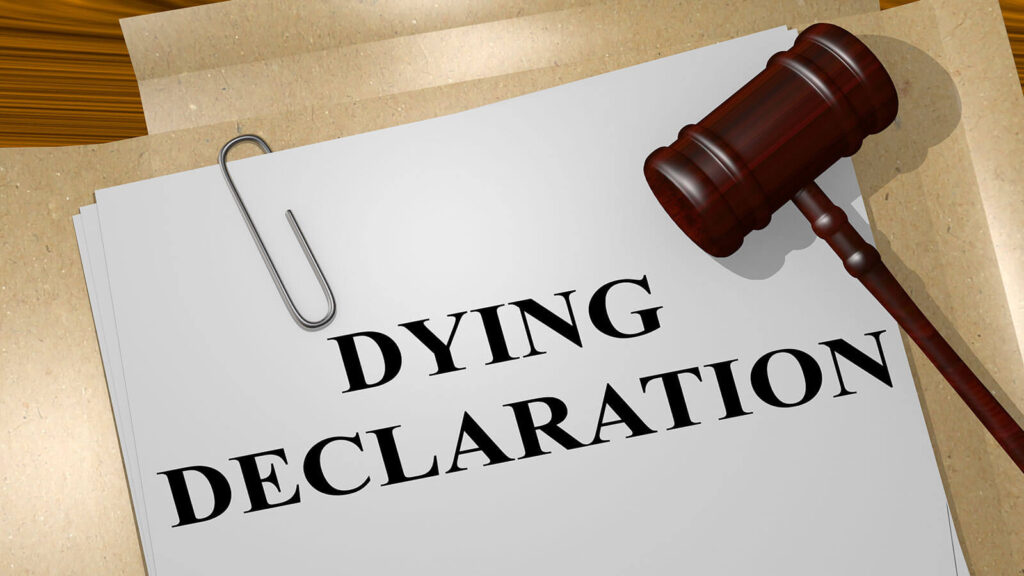
Since 1872, that is, when the Indian Evidence Act came into force, generations of Indian law students and the general public have been fed a rather strange notion about dying declaration. A dying declaration is a statement (oral, written or even by signs and gestures) made by a person (usually the victim of a crime, close to death) regarding ‘the purpose of his demise or as to any situations of transaction which resulted into his death’. The bizarre notion is that ‘truth sits upon the lips of a dying man’. In other words, it is believed that a dying person would not tell a lie. The question is why?
Dying declaration – the legal viewpoint
The concept of dying declaration is found in Section 32(1) of the Indian Evidence Act. Dying declarations are admissible in evidence. In Kushal Rao vs. State of Bombay (1958), the Supreme Court laid down the principles as to the circumstances under which a dying declaration may be accepted without corroboration. In Harbans Singh vs. State of Punjab (1962), U.P. vs Ram Sagar Yadav (1985) and Paniben (Smt) vs State of Gujarat (1992), etc. it was held that a consistent dying declaration made by one of competent mind is enough for conviction if found truthful in court. In the case of Sampat Babso Kale vs. State of Maharashtra (2019), the Supreme Court held that when there is doubt as to the veracity of any dying declaration, or whether the victim was in a fit state of mind to make the statement; then in such a case, the dying declaration cannot be treated as a sole basis for conviction.
Finally, in Jayamma and Anr vs. the State of Karnataka (2021), a Three-Judge Bench of the Supreme Court held that a dying declaration is not admissible as the sole basis for conviction unless corroborated with witness statements, facts, and circumstances of the case.
From where did that notion come in the first place?

You will be surprised to learn that the line ‘truth sits upon the lips of a dying man’ is lifted from a poem, ‘Sohrab and Rustum’, written by Mathew Arnold which, in turn, is about Persian folklore found in the ‘Shahnama’ (Story of Kings) of Firdousi in the late 10th century. The story is of two legendary warriors Rustum and Sohrab. Rustum was unaware that he had a son, Sohrab, by Princess Tahmina, though Sohrab was told of it. He had not seen the princess for many years. After years, as Fate would have it, they happened to face each other in battle, fighting on opposing sides. The spear hurled by Rustum mortally wounded Sohrab. While he was in the throes of death, Sohrab said that he was Rustum’s son. But Rustum did not believe it.
Rustum: “Yet here thou errest, Sohrab, or else men
Have told thee false—thou art not Rustum’s son.
For Rustum had no son; one child he had—
But one—a girl; who with her mother now…”
Sohrab: “Man, who art thou who dost deny my words?
Truth sits upon the lips of dying men…”
And who was Mathew Arnold (1822-1888)? He was a British poet who worked as an inspector of schools. Since literary merit is a highly subjective concept, I refrain from commenting on that aspect. He was a notable Victorian poet alright but there is no reason that we must accept a line from a poem (or for that matter from any literary work, or some folk wisdom handed down from antiquity) as a scientific truth with profound legal implications. It is an insult to intellect to even think so.
Poor Arnold could have never imagined that, influenced by it, another Victorian James Fitzjames Stephen (1829-1894) would incorporate its spirit in the Indian Evidence Act that he drafted, and thenceforth it would be immortalized in the Indian legal lexicon!
The sheer incongruity and illogicality of it

That a dying person would not like to meet his Maker with a lie upon his lips lest he be punished on the Day of Judgment for that is essentially a Christian concept reflecting the value system of Victorian England. The Victorians fondly believed that a man’s soul is essentially good but becomes evil and does evil deeds because of external influences. When the hold of external influences is weakened (such as near death), the soul tends to revert to its inherent goodness of character.
In Latin, it reads ‘nemo moriturus praesumitur mentire’, which means, a man will not meet his Maker with a lie in his mouth. Now, merely because something was said in Latin does not make it true. There is actually no scientific reason that a sense of impending death produces in a man’s mind the same feeling as that of a conscientious and virtuous man under oath. The legal history of the world is full of millions upon millions of witnesses consciously lying through their teeth under oath! Thus, without a scientific basis, it cannot be accorded the status of a legal maxim.
Our law enjoins upon everybody to respect other religions, their beliefs and practices; however, they are under no legal obligation to accept their tenets and abide by them because their own religions may hold different views.
For example, Hinduism does not believe that upon death, a person meets his Maker (in Hindu parlance Bhagwan, Paramatma, or Param Brahm etc.). According to the concept of transmigration of souls as enshrined in one of the holiest of the Hindu scriptures, namely the Bhagwad Gita, after it leaves one body on death, a soul takes up another body, and so on ad infinitum. It is only a one in billion souls that is able to raise itself spiritually so high that it would attain Moksha (salvation), that is, merger with the Paramatma, and thus freedom from the cycle of life and death.
There is no meeting with the Maker. All the rewards and punishments according to one’s karma are to be met within various lives of the soul. There is no special or extra punishment for a lie told near death nor can one make amends for all the misdeeds of his life on his deathbed by not uttering yet one more lie. Christianity has the concept of ‘forgiveness of sins’. In Hinduism, one has to necessarily pay the ‘karmic debt’ of his misdeeds and there is no forgiveness. ‘Prayashchit’ (repentance) only paves the way for further improvement, but no sin can ever be written off.
No scientific basis for the Victorian notion

In any case, there is no scientific basis for such a belief. Scientific evidence to the contrary is, on the other hand, much stronger. That is, being good, kind, considerate, peaceful, helpful, etc. are all acquired characteristics whereas by nature, the default behavioural setting of all creatures in general and humans in particular is being selfish, evil, aggressive or violent. One must make a conscious effort to be good; left to himself, he is more likely to remain evil. Those interested in a greater knowledge of the subject must read the voluminous amount of scientific literature published on the subject starting with Nobel Laureates Nikolas Tinbergen’s ‘The Study of Instinct’ (1951) and Konrad Lorenz’s ‘On Aggression’ (1966); and Anthony Storr’s ‘Human Aggression’ (1968), besides Ashley Montagu’s ‘The Nature of Human Aggression’ (1979), etc.
There is absolutely no reason that a person would or can forsake his basic nature or dominating instincts in his last moments. Human nature and its emotional compulsions remain the same irrespective of the possibility of death. In fact, if a dying person, in his perception, happens to be the victim of some gross injustice at the hands of the accused, he is very likely to be consumed by feelings of hatred or vengeance and is very likely to exaggerate things in his dying declaration so as to increase the chances of conviction of the accused. A dying person is, in fact, much more vulnerable to the pressures of internal emotions and external suggestions that happen to grip his failing mind than a healthy person in full command of his senses, who is aware of the consequences of his statement.
In Jagbir Singh vs. State (NCT of Delhi) (2019), on the issue of multiple dying declarations by the same person contradicting each other, it was held by the Supreme Court that the court must rule out the possibility of tutoring and prompting, and it must carefully examine the entirety of materials as also the circumstances surrounding the making of the different dying declarations.
Medically, a dying person is not even likely to be cogent and coherent

From a scientific perspective, the established fact is that as the body readies itself for what must be done at the approach of the end of its life, many core functions begin to change, slow down, or stop altogether. The brain’s ability to process cognitive thought is quite often one of these changing functions, and as a result, the dying man can exhibit a number of different behaviours confirming impaired mental ability.
Some degree of loss of cognitive function does occur in most patients in the week or two before death. (Quite amusingly, in India, dying declarations have been recorded even minutes or hours before death!) Technically, it is known as terminal delirium. Though not a distinct diagnosis, it implies delirium in a patient in the final days or weeks of life, where treatment of the underlying cause is impossible or impractical. It is characterized by a hyperactive or agitated state, a hypoactive state, or a mixture of the two.
The hallmark of delirium is an acute change in mental activity and attention with disorganized thinking, easy distractibility, hallucinations, delusions, visions, impaired short-term memory, or a fluctuating level of consciousness. Many people exhibit what is known as terminal restlessness also, characterized by anguish (spiritual, emotional, or physical), restlessness, anxiety, agitation, and cognitive failure.

The reasons include metabolic derangements (abnormal sodium levels, elevated calcium level, low glucose level or poor supply of oxygen to the brain); central nervous system pathology, drug/alcohol withdrawal, uncontrolled pain, the effect of medications (particularly pain medications), immobility, dehydration, and lack of sleep, etc. There is little to nothing that can be done about this if the patient’s circulatory system is not carrying enough oxygen in the blood to feed critical organs like the brain.
These are complex medical matters with an enormous body of scientific literature available. But a more elaborate discussion here would be beyond most readers.
However, it should not be difficult to understand clearly that, when the mental ability itself is impaired due to chemical changes in the body, there is no reason to believe that what the dying man utters would be coherent and logical and not the result of hallucinations or delusional or impaired thought. I have personally witnessed an instance where a senior officer on his deathbed was mumbling something. His wife and sons crowded him to hear as to whom he was professing his love in his last moments. To their dismay, he was mumbling the name of a boy from his village during his childhood!
Also Read: Is forensic science based on fact or fiction?
A police officer, judicial magistrate, doctor, friend, or family recording the statement, without the benefit of elaborate equipment and tests, simply cannot gauge from mere appearances and satisfy himself that the person making the statement is in a fit state of mind and is capable of making such a statement.
Thus the very concept of dying declaration has no scientific basis. It is a relic of Victorian England and poor scientific knowledge in that era. The dying declaration should not be accorded legal value more than any other statement at any other point of time in the life of the person concerned. Otherwise, every time it would be left to the lengthy process of the higher courts to decide upon the merit of the dying declaration, which wastes precious judicial time.

